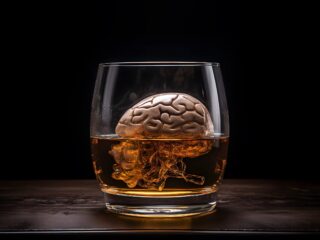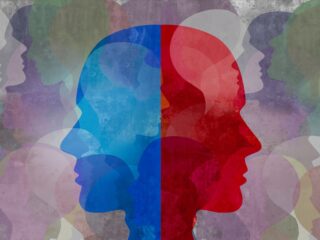The National Survey on Drug Use and Health (NSDUH) reports that 45% of people living in the United States have a dual diagnosis. A dual diagnosis occurs when a person experiences both a mental illness and a substance use disorder at the same time. Studies have shown that risk factors for developing a dual diagnosis include the following:
- Genetic predisposition, which is proven to influence one’s likelihood of developing a substance use disorder by up to 60%
- Environmental stressors, such as abuse, neglect, poverty, and stress
- Exposure to drugs and/or alcohol at a young age
Many people who develop this condition simply does so as a result of poor coping skills. For example, a person struggling with an anxiety disorder might turn to the use of benzodiazepines or alcohol to cope with their symptoms rather than reach out for help. As the anxiety disorder presses on, so does the desire to keep using, creating a dual diagnosis. Conversely, a person with a substance use disorder can start developing symptoms of a mental illness because of the impact drugs and/or alcohol are having on their brain. An example of this would be someone who abuses meth and suffers from psychosis as a result. No matter how the dual diagnosis develops, however, specialized treatment is essential for a full recovery.
How is a Dual Diagnosis Treated?
For decades, people presenting with a substance use disorder and a mental illness were told to sober up before they went looking for mental help. It was not considered to treat both conditions at the same time, rather to address them separately. For roughly three decades now, the idea of sequential treatment for those with a mental illness and a substance use disorder has been thrown out, as an integrated approach has been utilized instead.
Integrated treatment
The integrated treatment model of care developed for the treatment of dual diagnosis is geared at ensuring both the substance use disorder and the mental illness are being treated simultaneously. When utilizing the integrated treatment approach, both conditions are treated equally and recognized as a factor in each other’s existence. The healthcare professionals who offer integrated treatment work hand-in-hand with one another, meaning that both medical and mental health professionals are on the same page with how the patient’s treatment should unfold. There is no division between the two, rather a united front that is dedicated to carrying out complete, comprehensive care for the patient’s mental illness and the substance use disorder.
Effective integrated treatment should always include the partnership of healthcare professionals as well as a plan for continued care. Additionally, those providing effective integrated treatment should also:
- Understand the benefit of prescription medications designed to help reduce symptoms related to mental illnesses like anxiety, depression, borderline personality disorder, and schizophrenia
- Realize the importance of including medications proven to help reduce symptoms related to addiction (such as cravings and withdrawal symptoms) when applicable
- Approach the patient in a positive manner that offers support, boosts self-esteem, and keeps all lines of communication open
- Include loved ones into the overall treatment process so that they, too, can get the help they need and learn how to support their loved one in recovery
The patient’s team of professionals should also be well-versed in their medical and mental health history as well as be aware of the severity of both the substance use disorder and the mental illness.
Dual Diagnosis Rehab Options
Because this is such a common condition, many addiction treatment centers offer a dual diagnosis treatment program that is separate from their general programming. There are even treatment centers that are strictly developing as a dual diagnosis rehab, where nothing but dual diagnosis is addressed. Similarly to general treatment centers, dual diagnosis treatment can be offered through residential treatment and outpatient treatment.
Residential treatment in Ohio
Attending a residential treatment program in Ohio is an ideal option for individuals who are experiencing a severe dual diagnosis. This is because in residential treatment, there is more time allotted for recovery and there are several services that can be offered. For example, a person with a dual diagnosis may require detox services if they need to clear their system prior to delving into their therapeutic care. Traditionally, those with a dual diagnosis tend to need more time to detox, as the symptoms related to their mental illness can influence the speed with which they are able to stabilize. The kind of substance that a person abuses affects how long it might take to detox, meaning that it could take two weeks or more to complete this process. Residential treatment offers stays up to 90 days, allowing for patients to fully detox and still have time to obtain the integrated treatment model for their dual diagnosis.
Outpatient treatment in Ohio
Individuals who are not experiencing a severe dual diagnosis can benefit from outpatient treatment in Ohio. Rather than living at the facility as they would if enrolled in residential treatment, patients of an outpatient dual diagnosis rehab program in Ohio can continue to stay at home, work, go to school, uphold daily responsibilities and so on as they receive care. Patients will go to the dual diagnosis rehab center on the days they are to obtain treatment services and work with a team of professionals who are on board with one combined approach to their care. Outpatient treatment for dual diagnosis in Ohio is designed to provide patients with the in-depth care they need all while encouraging them to continue their path towards sobriety.
Does Someone You Love Have a Dual Diagnosis?
It can be extremely difficult to tell if your loved one is struggling with a substance abuse problem, a mental illness, or potentially both at the same time. Even the most experienced individuals can have trouble spotting this common condition. However, knowing what to look for can help significantly.
Some of the tell-tale symptoms of a dual diagnosis can include, but are not limited to, the following:
- Sudden behavioral changes
- Using addictive substances to self-medicate symptoms of a mental health problem
- Continuing to use drugs or alcohol despite the potential risks for doing so
- Isolating from friends, family, and loved ones
- Mood swings
- Thoughts of suicide
- Cognitive confusion
Keep in mind that because this condition can occur with any combination of substance and mental illness, symptoms can be more specifically related to what mental illness/substance the person is experiencing and using. For example, someone with a dual diagnosis of bipolar disorder and alcohol use disorder may unexplainably go from being difficult and depressed to overly excited and speaking a mile a minute.
Do You Need Help? Call Our Dual Diagnosis Rehab in Ohio Today.
If you are struggling with a mental illness and a substance use disorder, stop what you are doing and give us a call right now. At Ohio Addiction Recovery Center, we can help treat symptoms of dual diagnosis so that you can live a happy, healthy, and enjoyable life free from the confines of this complex condition.






